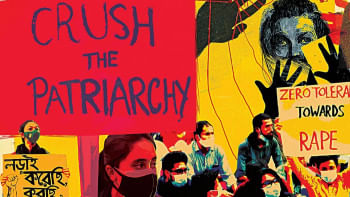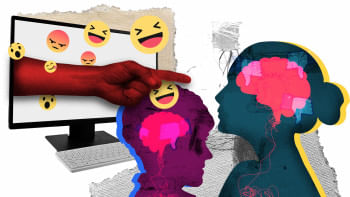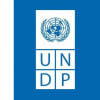Over 99 percent of Bangladeshis hold at least one bias against women

Nine out of 10 people in the world hold fundamental biases against women that span across regions, income levels, and cultures, according to the recently released UN Gender Social Norms Index (GSNI) by the UN Development Programme.
The sobering statistics in the index provide critical insights into the state of gender equality worldwide and demand our immediate attention. In Bangladesh, the index also reveals challenging statistics. Despite commendable strides towards gender equality in recent decades, entrenched discriminatory beliefs and practices continue to stifle women's access to resources and opportunities. This results in unequal access to education and jobs, limited participation in decision-making, and a persistent gender wage gap.
Bangladesh finds itself at a critical juncture, where the need for transformative action to challenge these norms has never been more pressing. So how can we redefine gender-biased norms and achieve true equality in Bangladesh?
The persistence of gender bias
Bangladesh has demonstrated a firm commitment to gender equality and women's empowerment, evidenced by its gender-responsive policies and budgetary allocations. Indeed, gender equality is firmly cemented in the constitution of Bangladesh. Yet, disparities persist.
Women spend eight times more time on unpaid care work than men and, according to the Labour Force Survey 2022, only 42 percent of working-age women participate in the labour force, often earning less than men, while only 13 percent of women own land.
Disturbingly, as per BBS data, 54 percent of women have experienced physical and sexual abuse at least once in their lifetime, and according to a recent study by Dhaka University and UNFPA, the preference for a son is still prevalent among parents in Bangladesh, with some choosing to undergo sex-selective abortion.
So why does gender discrimination persist despite efforts by the government and other stakeholders? The crux of the issue seems to rest on deep-rooted social norms and biases that policies alone cannot dismantle. These norms need a fundamental shift, starting with attitudes.
The GSNI highlights a troubling reality. Over 99 percent of people in Bangladesh hold at least one bias against women, with 69 percent believing that men make better political leaders and 88 percent thinking that men are more capable business executives and are deserving of greater job opportunities. Even more concerning, over 99 percent of women hold biases against their own gender, perpetuating the very norms that hold them back.
Understanding the root causes of gender bias
At the heart of gender bias in Bangladesh lie norms undervaluing women's rights and capabilities. The roots of these are complex and intertwined with historical, cultural, social, and economic factors. Patriarchal norms still dictate men as primary decision-makers and breadwinners, while relegating women to subordinate roles. Child marriage persists, limiting girls' access to education and economic opportunities, reinforcing traditional gender roles.
Gender disparities in the labour market and social norms discouraging women's participation contribute to and perpetuate this inequality. Despite improved education access, women's economic prospects remain limited due to perceptions limiting their involvement in the public sphere. Balancing family and work is a challenge, which hinders economic independence. Political and corporate leadership in Bangladesh remains male-dominated, limiting women's influence.
The economic and political case for gender equality
The GSNI highlights the close link between gender norms and other development indicators such as health outcomes and environmental sustainability. Challenging these norms is therefore essential not only for gender equality but also for achieving the Sustainable Development Goals (SDGs).
For Bangladesh to prosper economically and politically, embracing gender equality is non-negotiable. The McKinsey Global Institute pinpointed a staggering $28 trillion potential boost to the global GDP by 2025 if women played an identical role in the economy to men.
Notably, countries with women at the political helm tend to prioritise crucial public goods – like education and infrastructure – championing not just immediate progress but fostering profound social transformation. An illustrative case is the US Congress, where female legislators consistently eclipse their male peers in legislative productivity and securing resources for their constituencies. For Bangladesh, the path is clear: investing in women is not just ethically right, it is an economic and political imperative.
Addressing discriminatory social norms
Genuine progress requires us to challenge entrenched beliefs and empower women to thrive as equal partners in Bangladesh's development journey and progress. Addressing these deep-seated norms requires a coordinated and whole-of-society approach. To create lasting change, we must adopt a proactive strategy that begins with nurturing the minds of future generations through gender-sensitive education that fosters critical thinking and reshapes societal perceptions. Moreover, engaging with local communities and grassroots organisations, including religious groups, is crucial to cultivate progressive attitudes towards women's rights. Social media can be a potent tool to challenge stereotypes and biases, amplifying women's voices, and advocating for their rights.
But advocacy alone won't cut it. We must enforce existing laws and close legal loopholes. Sensitising law enforcement about gender issues is essential for effective implementation.
Promoting women in leadership and ensuring equal pay is vital. Policy reforms and parental leave incentives can alleviate the unpaid care burden on women, while encouraging men to share responsibilities. Innovative and inclusive policy solutions tailored to diverse women's needs must be developed and adequately financed.
Women cannot achieve all this alone; men must also engage as active allies in the fight for gender equality. Challenging discriminatory beliefs benefits everyone, as traditional expectations of masculinity often challenge men's own well-being. Promoting positive masculinity and debunking traditional stereotypes will foster an environment where men can actively empower women.
The 2023 GSNI is a call to action – an opportunity for Bangladesh to continue evolving towards a brighter, more equitable future. Together, we can build a society where every individual, regardless of gender, can contribute to making Bangladesh and the world a better place for future generations.
Stefan Liller is resident representative at UNDP Bangladesh.
Views expressed in this article are the author's own.
Follow The Daily Star Opinion on Facebook for the latest opinions, commentaries and analyses by experts and professionals. To contribute your article or letter to The Daily Star Opinion, see our guidelines for submission.

 For all latest news, follow The Daily Star's Google News channel.
For all latest news, follow The Daily Star's Google News channel. 











Comments